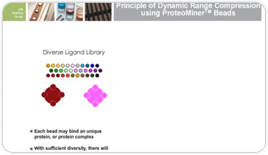
Experimental Strategies for Biomarker Discovery and Development
August 22, 2007
Dr. Diane McCarthy
All users:
Register to play video
![]()
Abstract:
Typical biomarker studies can be divided into four phases: discovery, validation, purification and identification, and assay development. We will discuss these phases and present approaches for optimizing biomarker workflows to deliver robust biomarkers and biomarker assays. Case studies using the ProteinChip SELDI system in both preclinical and clinical areas will be presented to illustrate optimized biomarker workflows.
In the discovery and validation phases, it is especially important to optimize study design and statistical methods to avoid preanalytical bias and to yield robust markers. Identification can be performed at the end of the discovery phase or at any point during the validation phase. Identification generally requires standard protein purification procedures, such as column chromatography, size filtration, and SDS-PAGE, followed by protease digestion and sequence analysis on a tandem mass spectrometer. Identification of biomarkers provides insight into disease biology and facilitates the development of analyte-specific assays. Once the biomarkers have been positively identified, quantitative assays can be developed for routine testing on an appropriate immunoassay platform (SELDI, Bio-Plex suspension array system, or ELISA). SELDI-based immunoassays are particularly useful for detecting biomarkers with posttranslational modifications.
About the speakers:
Dr. Diane McCarthy oversees the operation of Bio-Rad's Biomarker Research Centers. She received her PhD in biochemistry from The University of Texas at Austin, and she completed a postdoctoral fellowship focused on protein expression, purification, and structural analysis. She has over 5 years of experience managing biomarker research collaborations with leading academic groups (including the National Cancer Institute and Johns Hopkins University) and pharmaceutical companies (including publicly disclosed collaborations with Novartis, Bayer, and Sanofi-Aventis).
